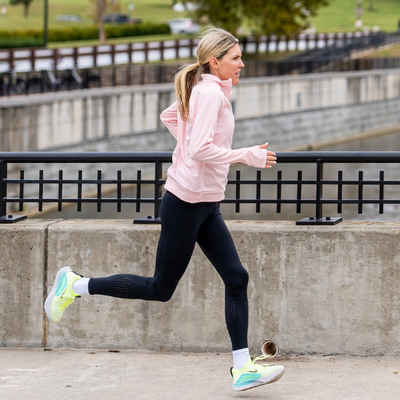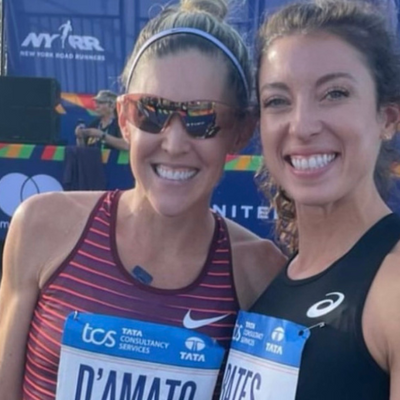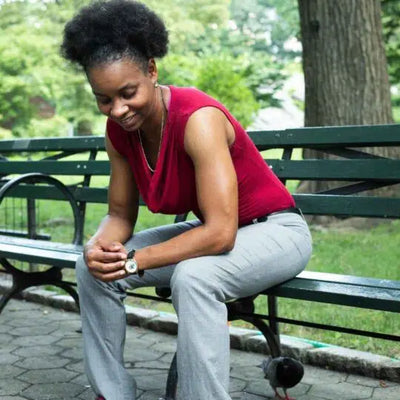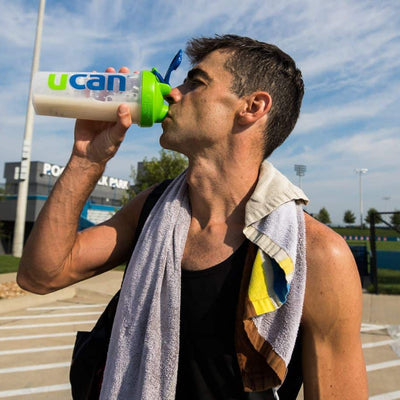By Jocelyn Todd
Running is perhaps the simplest sport and brings joy and community to many of us. But it doesn’t take much to realize there’s also a “dark side” to running – the concept of "race weight" can make us obsessed with our stats and our performance and it's tempting to toe a razor-thin line of dangerously low fueling to get an “edge”. It's true that there is interplay between weight and performance, but as a result, the sport is plagued by disordered eating and eating disorders across all levels, with women and men, girls and boys alike. So why do so many of us form these complicated relationships with running, and how can we work on this relationship?
The Key to Loving Running
I’ve found the key to loving running and performing your best is balance. Balance for running can be intricate and comes in many flavors – hard efforts vs recovery, intensity vs volume, or pushing through vs playing it safe. My focus for this piece and the foundation for everything is balancing your fueling for performance. Your fueling balance will have both short-term and long-term effects on your running performance.
For example, eating too much or too little the day of a hard effort will limit your performance on that day. Eating too much or too little over long stretches of time can lead to serious injury or limit your potential and will require long-term, big picture adjustments. So how do we get back into balance with our fueling and maintain a healthy relationship with running? By shifting your focus to consistency, stability, and constant, patient attention to your body.

Taking a Long Term Approach
Notice right off the bat that these words are all long-term concepts. None of them can be measured over a day, a week, or even a month. These changes will take time. Consistency puts your body in a rhythm and leads to stability. Attention to your body lets you know if the inputs are too much or too little over time.
Think of trying to get better sleep. You want to go to bed and wake up at the same time every day so your body can naturally expect and adapt to these conditions. This will lead to stable levels of energy and less unexpected swings of lethargy. Over time, you will notice you are constantly tired or getting up earlier than expected and this will guide you in determining how much sleep you need.
In the same fashion, giving your body a consistent supply of healthy fuel will keep you content by allowing a stable metabolism. You will notice reduced fatigue and less energy swings. In addition to timing, the type of food is crucial in providing this stability. Consistently providing yourself with wholesome foods will provide stability of blood sugar, lead to an even more stable metabolism, and further protect you from excess fatigue. It seems simple, and I know first-hand that it is not. That's why I want to share what I've done recently to help preserve my fueling balance.
My Marathon Story
In 2016 I started training for my first marathon. I had been a 5-year NCAA Division I college athlete and thought I knew how to fuel myself pretty well. Like many others, I abided by the “traditional” fueling strategy: pre-run take in simple carbs for fast energy and minimal GI-distress, post-run get more simple carbs and electrolytes to quickly replace what you used. This protocol worked when my races were 10k at the longest, but once I started training for marathons it quickly became apparent that this method fell short of my fueling needs. I was constantly feeling lethargic and fatigued. In my workouts and my races, I noticed a severe drop-off point in energy after 1.5-2 hrs, also known as a “bonk”, where I couldn’t push myself no matter how hard I tried. At this time, I thought that it was normal. Marathon training is hard, so you should feel tired is what I told myself. I'm so happy to report that there are better ways you can fuel yourself to preserve your fueling balance.Fueling with UCAN
I started using UCAN in January of 2018, after a friend told me he could rely solely on taking it before a marathon without taking in anything else but fluids. The thought of not needing to carry gels or gummies with me on the course was too good not to test. I started just using it on my long runs and workouts and quickly found I could rely completely on the LIVSTEADY as an energy source for these long and intense sessions.
When I ran my first marathon using UCAN, this simplified fueling strategy lead to a PR of 9 minutes and a time of 2:39:23, a U.S. Olympic Trials qualifying time! Later that year, I kept working with UCAN and refining my training and cut another 3 minutes off to achieve the U.S. Olympic Trials A standard with my time of 2:36:30. UCAN is an important tool in my training and racing repertoire. Because it provides me with stable energy, I know I can rely solely on it for my workouts and races. Because the consistent energy prevents the crash from simple carbohydrates, I don't get the ravenous feeling after a hard effort and I don't feel the need to grab more quick energy carbs to bump my energy levels back up. I've noticed this leads to subtle decreases in my fatigue after each training session and over time, a more balanced fueling and training protocol with more consistent, steady, and manageable levels of hunger and fatigue.
Overall, the stability of energy allows me to pay close and patient attention to my body's needs. I can then assess how I am feeling on a bigger picture scale to determine if I should gain or lose weight for my performance. This long-term approach allows me to be confident in my fueling strategy and maintain a healthy relationship with my body and running. I hope this has helped explain how I use UCAN to achieve success in a healthy way, amidst the constant news we hear about race weight. My final word is to reiterate that these concepts take time to implement so please be patient with yourself and your body - it is working hard for you! 😊








